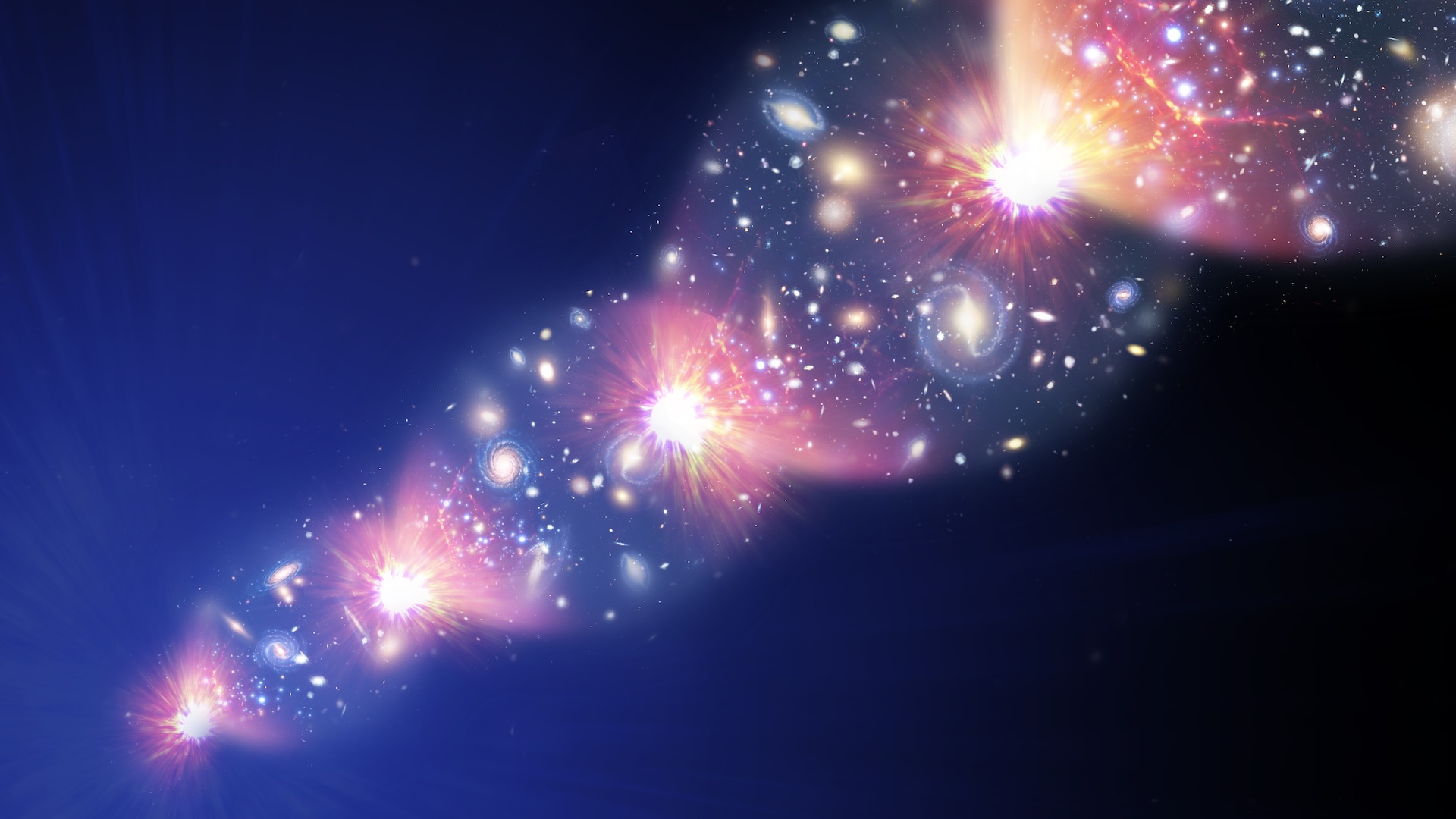
Scientists have a pretty good idea of how our universe began: According to the Big Bang theory, an infinitely small, dense point rapidly expanded 13.8 billion years ago, and the universe has been experiencing accelerating expansion ever since. However, trying to imagine where our universe might go next, or even how and when it might eventually end, is still fiercely debated.
“In physics, we can only trust our ideas and theories when we gather the data that test them and confirm them,” Nemanja Kaloper, a professor of physics at the University of California, Davis, told Live Science in an email. “[But] in cosmology that is notoriously difficult since the experiments are passive — we cannot recreate the universe to see how things go and improve the data sets at will.”
So, exactly when will the universe end? That depends on which theory you find the most convincing. Two of the top leading theories are called the Big Freeze and the Big Crunch.
Related: Could a black hole devour the universe?
The Big Freeze
For Henry Tye, a professor emeritus of physics at Cornell University, the most likely scenario is the “Big Freeze.”
“This is what is already happening right now,” Tye said. “The universe’s expansion will become faster and continue for 100 billion years, a trillion years or forever. There’s no end point.”
One cosmological model that explains this expansion is the idea that our universe is expanding toward an area called “de Sitter space,” which is a part of space with intrinsic positive energy that may be helping push the universe outward. This means that the universe wouldn’t necessarily end, but it wouldn’t stay the same, either. As the name implies, the Big Freeze would dilute energy in the universe by so much that any form of activity — such as the burning of stars or the churning of black holes — would come to an end. This is what physicists call the “heat death of the universe.”
The Big Crunch
However, it’s also possible that this positive de Sitter space could one day decay into negative energy, which would reverse the direction of the universe.
“That would [mean] the Universe expands for a bit before reaching a max and then turns around,” Antonio Padilla, a professor of physics at the University of Nottingham in the U.K., told Live Science in an email. “Such a universe would end in a crunch.”
This “Big Crunch” would essentially reverse the expansion of the Big Bang and erase our universe. The spooky thing about this scenario, Tye said, is that it might already be happening in pockets throughout the universe, but it would be largely undetectable because evidence of those areas of space would be erased.
Some recent models have predicted that a Big Crunch, driven by dark energy — the mysterious force driving the accelerated expansion of the universe — could begin as soon as 100 billion years from now. In particular, this timeline was determined by studying a theoretical model of a type of dynamical dark matter called “quintessence.” Conversely, in a paper Padilla contributed to in 2021, he found that the universe has at least another trillion years left — which he said was on the shorter end of estimates. This determination was made using the ideas of string theory, which imagines particles as tiny 1-dimensional strings instead of points.
Even then, the universe might not be ready to stop existing completely. Some scientists believe that a Big Crunch may just be part of a larger cycle of expansion and contraction that took place in the early universe called a Big Bounce. In this idea, the universe would “start” with rapid expansion (i.e. a Big Bang) and expand for a while before eventually collapsing again into the conditions necessary for another Big Bang.
As for which theory is correct, it’s hard to say with total certainty, Padilla said.
“Predicting the far future is hard,” he said. “My view is that observations can only take us so far here because of the very nature of what we are dealing with.”
Even if none of these theories is correct, there may still be an expiration date on when all the regular matter in the universe — stars, galaxies, and even remnants of dead stars, such as black holes — will simply cease to be. Due to a type of spontaneous radiation predicted by Stephen Hawking, everything in the universe could slowly evaporate to nothing, a 2025 study published in the Journal of Cosmology and Astroparticle Physics suggests. The proposed timespan for this total evaporation is 1 quinvigintillion years — that’s 1 followed by 78 zeros, or 1078.
According to Tye, there is no one piece of evidence that could fully prove a theory about the universe’s fate. Instead, cosmologists must improve existing models of our universe and extrapolate them infinitely. Gaining a better understanding of complicated topics like dark energy and string theory is one way scientists can better predict where our universe is going.
